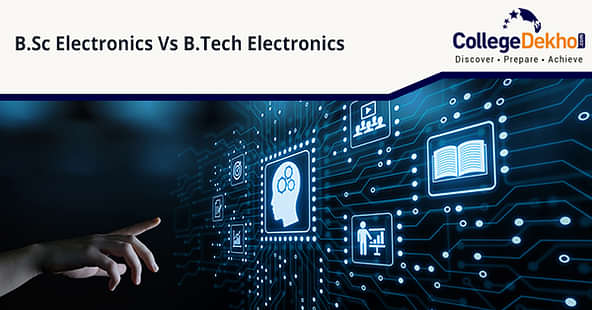Electronics is the branch of Science, which deals with the movements of electrons in a medium or vacuum. When it comes to choosing a course in electronics students are mostly confused between B.Sc Electronics and B.Tech Electronics.
- B Sc in Electronics vs. B Tech in Electronics:
- Bachelor of Science in Electronics (B Sc Electronics)
- B Sc Electronics Eligibility Criteria
- B Sc Electronics Application Process
- B Sc Electronics Fee Structure
- B Sc Electronics Scope
- B Sc Electronics Colleges
- Bachelor of Technology in Electronics (B Tech Electronics)
- B Tech Electronics Eligibility Criteria
- B Tech Electronics Application Process
- B Tech Electronics Fee Structure
- B Tech Electronics Scope
- B Tech Electronics Colleges

Electronics is the branch of Science, which deals with the movement of electrons in a medium or vacuum. The branch is further categorised into digital electronics, analogue electronics, telecommunication, Integrated circuit, semiconductor device, embedded systems, VLSI, audio electronics, etc.
The application of electronics branch is widely seen in the telecommunication industry, information processing, signal transmission, control systems, circuit design, etc. The scope of electronics branch can be widely seen in the electronics industry. The electronic devices that we use in our day-to-day life are made up of integrated circuits and functions on the movement of electrons. Today, the electronics sector is one of the fastest-growing sectors in the world.
Electronics sector plays a major role in the manufacturing of electronic devices, which are mostly used by people in their day-to-day activities. These devices include smartphones, television, electrical appliances, sensors and many more. With the rising demand of the consumers, the electronics industry is one of the most demanding industries in today’s world. The electronics sector provides opportunities to people who are interested in making a career in the design and manufacture of electronic components.
Students who are planning to make a career in the electronics industry can undertake a bachelor’s degree in electronics. The popular courses in electronics in India are B Sc in Electronics and B Tech in Electronics.
B Sc in Electronics vs. B Tech in Electronics:
Comparison factor | B Sc in Electronics | B Tech in Electronics |
|---|---|---|
Duration | 3 years | 4 years |
Degree | Undergraduate | Undergraduate |
Eligibility Criteria | 10+2 in Science with Physics, Chemistry and Mathematics as mandatory subjects | 10+2 in Science with Physics, Chemistry and Mathematics as mandatory subjects |
Graduates | Science Graduate | Engineering Graduate |
Course Fees | Rs. 10,000 - Rs. 1.5 lakh | Rs. 2-4 lakh |
Average Starting Salary | Rs. 3-4 lakh | Rs. 3-6 lakh |
Study Area | Focuses on Applied Sciences | Focuses on Technical and Industrial education |
Career Option |
|
|
Bachelor of Science in Electronics (B Sc Electronics)
Bachelor of Science in Electronics is an undergraduate course, which can be completed in 3 years (6 semesters). Students who complete B.Sc in Electronics are science graduates. It is a specialised course, which is designed to help students understand the fundamentals of electronics and pursue a career in the electronics field.
B Sc Electronics Eligibility Criteria
Students who want to apply for B Sc in Electronics must meet the minimum eligibility criteria mentioned below:
- Must have successfully completed Class 12th from a recognised board
- Must have Physics, Chemistry, and Mathematics as mandatory subjects in Class 12
B Sc Electronics Application Process
There is no specific admission procedure to apply for B.Sc in Electronics course. Students who meet the minimum eligibility criteria can directly apply at the college or the University. Some universities conduct their own entrance examination for admission to B Sc Electronics. Admission is based on the students' performance in the relevant examination. Students must appear in the examination to be eligible for admission.
B Sc Electronics Fee Structure
The tuition fee for B Sc Electronics varies from university to university. The average fee for B Sc Electronics range between Rs. 10,000 to Rs 1.5 lakh for the complete course.
B Sc Electronics Scope
After completing B Sc in Electronics, students can work for leading companies such as Intel, Samsung, L&T infotech, Huwaei, HCL, Infosys, etc.
Students can go for higher education in electronics and study M Sc Electronics. They can select the specialisation of their choice like embedded systems, VLSI, control system, etc.
Every year, there is some vacancy for B Sc Electronics graduates in Indian Railways, Banking Sector and Public Sector Units. Students can check for updates and apply for the same.
B Sc Electronics Colleges
There are various institutes in India that offer B Sc in Electronics . Some of them are listed below:
Bachelor of Technology in Electronics (B Tech Electronics)
B Tech in Electronics is an undergraduate course, which can be completed in 4 years (8 semesters). Students who complete B Tech in Electronics are engineering graduates. Students who have completed Class 12th can join an engineering college to complete B Tech in electronics course. The course is designed to focus on the design and development of electronic systems.
B Tech Electronics Eligibility Criteria
Students who want to apply for B Tech in Electronics must meet the minimum eligibility criteria given below:
- Must have successfully completed Class 12 from a recognised board
- Must have Physics, Chemistry, and Mathematics as mandatory subjects in Class 12
- Must score at least 50% in PCM in Class 12th
B Tech Electronics Application Process
Students who plan to take B Tech in Electronics must undertake a national level or state-level engineering entrance examination. Admission is based on the merit list. Based on the ranking in the examination, students are called for the counselling process at the college. Upon successful completion of the counselling process and admission confirmation, the students can join the college.
B Tech Electronics Fee Structure
Fees for B Tech in Electronics varies college-wise. The average fee for B.Tech in Electronics ranges between Rs.2 lakh to Rs. 5 lakh for the complete course.
B Tech Electronics Scope
There are numerous opportunities for students who hold a B Tech degree in Electronics. Some of them are listed below:
After completing a bachelor’s degree, students can get a job in leading companies. The leading recruiters for electronics students are Intel, Samsung, L&T infotech, Huwaei, HCL, Infosys, etc.
Students can go for higher education in electronics and study M.Tech in electronics. They can select the specialisation of their choice like embedded system, VLSI, control system, etc.
Students can appear for GATE examinations and join public sector unit like NTPC, Bhel, Power Grid, etc.
B Tech Electronics Colleges
There are various institutes in India that offer B Tech in Electronics . Some of them are listed below:
Now that a comparison has been made between B Sc in Electronics and B.Tech in electronics, students can make a decision whether to choose B Tech in Electronics or B.Sc in Electronics. Students must analyse their abilities and their interest before choosing anyone. Those who are interested in applied sciences and want to go for research or make a career as a lecturer can choose B Sc in Electronics. Students who are interested in technology and want to join a firm immediately with a good package can pursue B Tech in Electronics. In both cases, the student must choose the college wisely.
Keep visiting CollegeDekho for more news and articles.
Are you feeling lost and unsure about what career path to take after completing 12th standard?
Say goodbye to confusion and hello to a bright future!

GATE Previous Year Question Paper
Was this article helpful?



















Similar Articles
Polytechnic Courses 2025: Details, Fees, Eligibility, Admission Criteria
JEE Advanced 2025 Exam Day Instructions - Documents to Carry, Guidelines
How to Score 200+ Marks in JEE Advanced?
JEE Advanced 2025 - Top 5 Preparation Tips and Tricks
Most repeated questions for JEE Advanced 2025
JEE Advanced 2025 Syllabus: Check JEE Advanced Subject-Wise Detailed Syllabus PDF, Important Topics